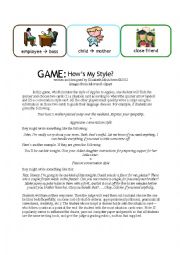
|
How�s My Style? game
Have you ever wondered how you can help you students become more aware of how language changes in different situations and relationships?
This game will help your students realize their need for and practice changing the style of language depending on whether they�re in a formal (boss, customer) or informal (child, friend) relationship.
You...
Level: advanced
Age: 12-17
Type: activity-card
Downloads: 18
|
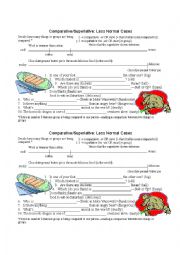
|
Comparative/Superlative--unusual cases
I noticed that my English textbook expected students to use the comparative and superlative in some unusual cases--with and without "than," with comparison of a group to one person, with -ly adjectives, and so on. So I developed this practice sheet to help students notice these unusual cases.
Answers: bigger, older/oldest (depends on the context)...
Level: elementary
Age: 11-17
Type: worksheet
Downloads: 58
|
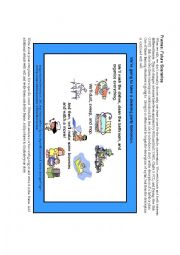
|
"Going to" as a frame for plans with "will"
This activity explains how "going to" and "will/�ll" work together in descriptions of future plans and helps students to visualize the relationship with a frame in which they can illustrate their plans.
Level: intermediate
Age: 10-17
Type: activity-card
Downloads: 2
|
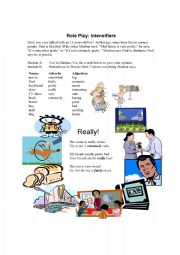
|
Precise Paul and Intensifiers: somewhat, fairly, really, extremely
Precise Paul always corrects his sister. Students will follow this role play to practice changing the degree of adjectives with intensifiers (somewhat, fairly, pretty, really, very, and extremely). You might change his name to Precise Peter for a more pleasant pronunciation.
Level: elementary
Age: 11-17
Type: flash-card
Downloads: 13
|
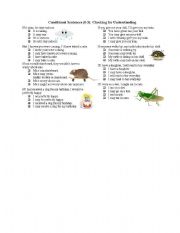
|
Conditional Meaning Check--Zero to 3rd
This worksheet will stimulate discussion about the meaning of the different conditional forms (zero, first, second, and third). Students cannot complete the worksheet without thinking about the meaning. There is room on the page for two copies of the worksheet. (It was too large to upload that way.) If you remove section headings and go back to 1 c...
Level: advanced
Age: 14-17
Type: worksheet
Downloads: 5
|

|
Popcount! (game) Logo (to place on the back of the 72 cards)
Inspired by an alphabet game for preschool students, this game practices instead count and noncount nouns + food vocabulary. I made up this game to review the vocabulary given in Unit 12 of Cambridge�s Touchstone Level 1 materials. There are 6 sheets of game cards and a sheet with the correct number of logos (for pasting on the back of the cards).
Level: elementary
Age: 8-17
Type: activity-card
Downloads: 7
|
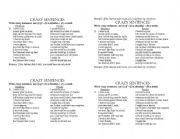
|
Second Conditional: Crazy Sentences
This activity practices the second condiitonal, asking students to make silly sentences by choosing If + an imaginary situation + a result (with would/could/might).
Level: intermediate
Age: 13-17
Type: activity-card
Downloads: 9
|
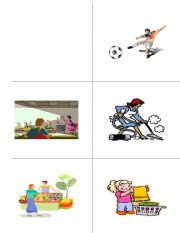
|
Simple Present Flashcards Part B
See also Part A. Print the cards on cardstock. Stick the verb to the back of the card. Then laminate. Drill verbs, turning them around if students don�t know what verb is represented. Ask students to give simple present sentences: he plays soccer, they exercise, she cleans the house, etc.
Level: elementary
Age: 8-17
Type: flash-card
Downloads: 4
|
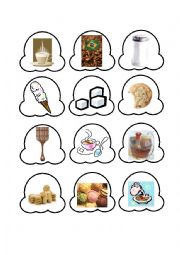
|
Popcount! (game) Game Card Sheet 3
Inspired by an alphabet game for preschool students, this game practices instead count and noncount nouns + food vocabulary. I made up this game to review the vocabulary given in Unit 12 of Cambridge�s Touchstone Level 1 materials. There are 6 sheets of game cards and a sheet with the correct number of logos (for pasting on the back of the cards).
Level: elementary
Age: 8-17
Type: activity-card
Downloads: 16
|
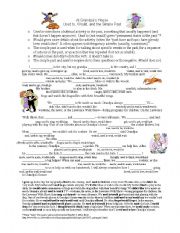
|
At Grandpa�s House: Used to, would, and simple past
A description with options for the past.
Level: intermediate
Age: 10-17
Type: worksheet
Downloads: 71
|
|
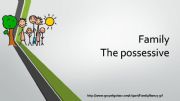
Family, Possessive Adjectives, Part A
Help your students learn the English word order with possessives through processing instruction exercises.
Level: elementary
Age: 8-100
Downloads: 22
|
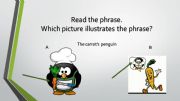
Family, Possessive Adjectives, Part B
Help your students internalize the word order for English possessive adjectives with processing instruction exercises!
Level: elementary
Age: 8-100
Downloads: 23
|
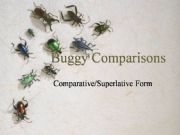
Buggy Comparisons
Cheerful (free Microsoft clipart) bugs illustrate comparisons using both the comparative and superlative forms. There is first an explanation of the rules for comparative and superlative, then several examples of each and then extra practice for the student.
Level: elementary
Age: 10-17
Downloads: 6
|

Review of Units 7-8 (Infinitives, clauses of time)
Original exercises as review for Interchange Level 2, Units 7-8
I�ve removed the images to meet the size limit requirement
Level: intermediate
Age: 13-100
Downloads: 11
|

Family, Possessive Adjectives, Part C
Help your students learn the English word order to use with possessives (assimilating the difference between my mom�s dad and my dad�s mom). I divided the presentation into three parts because the instructions said the max. size was 2MB.
Level: elementary
Age: 8-100
Downloads: 19
|
|
|